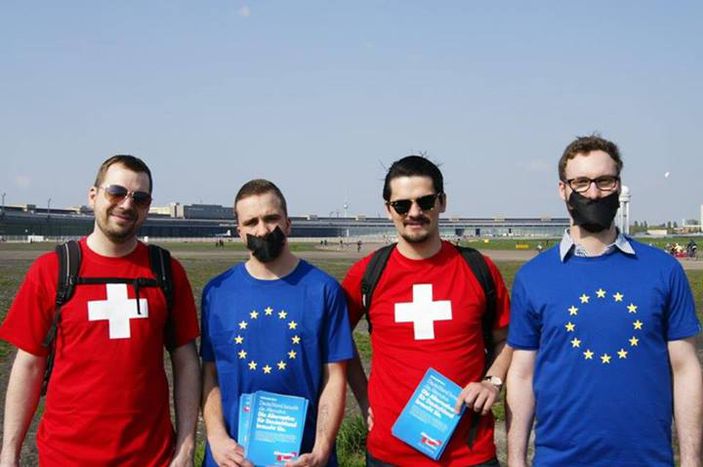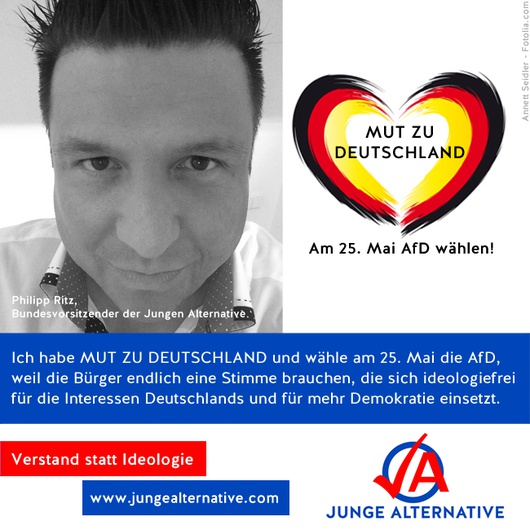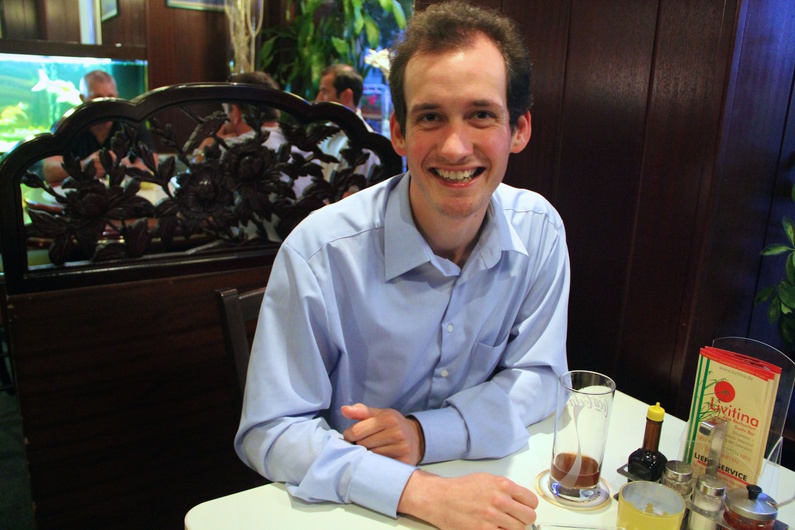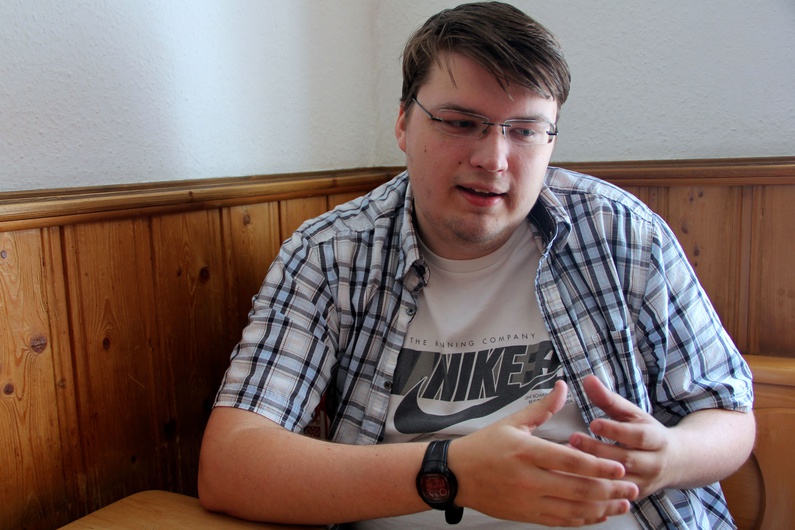
Young Populists in Germany: The Attractive Alternative?
Published on
Translation by:
Garen Gent-RandallNo to Merkel, no to the euro, yes to the free market – this is what motivates young German eurosceptics. The Alternative für Deutschland party (AfD), founded just a year ago, received 7% of the votes at the European elections. But some accuse it of populism and of turning a blind eye to its nationalist members. What do the young activists think?
Although the AfD (Alternativ für Deutschland) blew out its first birthday candle last March, the eurosceptic party formed by the economist Bernd Lucke remains largely unknown outside of Germany. Alongside the main party, which today has almost 19,000 members, a more radical and more controversial group of 400 young activists, the Junge Alternative (JA) was formed.
POLITIcally INCORRECT
Before heading to Berlin, I contact Philipp Ritz via Skype. He is 32 years old, an AfD member and a spokesman for the Young Alternatives, the independent youth branch of the eurosceptic party, based in Bonn. From the start of the interview, the activist avoids political correctness and uses "shock" phrases: "I hate politicians," he says, grimacing. "They tend to be corrupt and don't tell people the truth." He doesn't hide his irritation at the European institutions he thinks are anti-democratic, mentioning "the forced passing of the Treaty of Lisbon", and wants indebted countries to leave the euro. When asked if the group is populist, he says, against all expectations, that populism is a good thing: "it means we're close to the people".
 But the statements made by the spokesman for the young eurosceptics are more radical than those of the main party. The Young Alternatives discuss a wide rage of topics from libertarianism and criminality to anti-feminism. Although the AfD essentially concentrates its efforts on the economy and refuses a political label, experts nonetheless place it to the right of Angela Merkel's CDU (Christlich Demokratische Union). For Nils Diederich, professor at the Free University of Berlin, the AfD isn't nationalist "at the political level", like other European eurosceptic parties, but "at the economic level".
But the statements made by the spokesman for the young eurosceptics are more radical than those of the main party. The Young Alternatives discuss a wide rage of topics from libertarianism and criminality to anti-feminism. Although the AfD essentially concentrates its efforts on the economy and refuses a political label, experts nonetheless place it to the right of Angela Merkel's CDU (Christlich Demokratische Union). For Nils Diederich, professor at the Free University of Berlin, the AfD isn't nationalist "at the political level", like other European eurosceptic parties, but "at the economic level".
A STRONG ECONOMY
My interview with Norbert Kleinwächter, an AfD candidate in the Dahme-Spreewald regional parliament, takes place near Templehof's airport, currently under construction. At random, he has chosen an Asian restaurant. Kitsch décor, pop music. We order two cokes. The young teacher of 28 explains, in perfect French, his fear of seeing the extreme-right Front National win the next presidential elections in France then forcing the country to leave the EU. He confirms that the AfD's euroscepticism is very different from that of parties like the Front National or UKIP, the AfD calls itself "anti-euro", not "anti-EU". But Germans are sceptical. "A friend of mine deleted me on Facebook when she saw I was in the AfD, without even trying to have a discussion with me about it," Norbert says.
For now, he doesn't want to join the Young Alternatives, as it isn't clear where the group is heading. His reason for being involved with the eurosceptic party "is to save the European idea threatened by the crisis". The reason? The euro. "We want to give member states the possibility of leaving the euro," he says. Without advocating a return to the deutschmark, the AfD wants a strong German economy without currency depreciation while distancing itself from indebted countries. And the finger is pointed first at Greece.
 But talking about the economy isn't always very sexy. So to attract voters, the AfD often simplifies its language and thus attracts the label of 'populist'. "It's true that in the campaign, we had to reduce our ideas down to simpler slogans, especially so they would fit on a poster," Norbert admits. Among these slogans: "The Greeks suffer, the banks profit!" or "more to citizens, less to Brussels".
But talking about the economy isn't always very sexy. So to attract voters, the AfD often simplifies its language and thus attracts the label of 'populist'. "It's true that in the campaign, we had to reduce our ideas down to simpler slogans, especially so they would fit on a poster," Norbert admits. Among these slogans: "The Greeks suffer, the banks profit!" or "more to citizens, less to Brussels".
GETTING RID OF NATIONALISM
Although the party claims to be entirely democratic, nationalist fringe groups are attracted by AfD's alternative and new discourse. But Norbert Kleinwächter says that the party does not accept these extremists. "We ask all new members to mention any political parties they have already been members of. If we see NPD (the neo-Nazi parti), for example, we refuse them", he says. In the regional body, Norbert and the executive committee have to judge each prospective member's case.
A few days later, I meet Sebastian Kowalke, a member of the AfD and the Young Alternatives in the central Berlin neighbourhood of Charlottenburg. After getting lost in the gay pride, we head through the doors of Ambrosius, a bar where AfD members often meet up. The 21-year-old student offers an explanation of the more radical character of the Young Alternatives. "They have less to lose than their elders who have a job and a family," he says, "they feel more free and they're taking their positions." When it comes to nationalist members, the activist says he does not hesitate to talk with them to convince them that extremism is not the answer.
 To be credible, the AfD will have to find a solution to distance itself from its nationalist members. The party will also have to keep watch on the youth association's behaviour. Despite the watchful eye, the Young Alternatives didn't hesitate to invite UKIP leader Nigel Farage to talk at a conference in Cologne last March, angering AfD members. Professor Diederich highlights the risk to the longevity of the new party, which could quickly be snuffed out. Although the AfD took seven seats at the European Parliament, it is because only 1 out of 2 Germans on the electoral register turned up to vote. According to Professor Diederich, protest parties always get more votes when there is a higher abstention rate. They are, perhaps unfortunately, the most mobilised of voters.
To be credible, the AfD will have to find a solution to distance itself from its nationalist members. The party will also have to keep watch on the youth association's behaviour. Despite the watchful eye, the Young Alternatives didn't hesitate to invite UKIP leader Nigel Farage to talk at a conference in Cologne last March, angering AfD members. Professor Diederich highlights the risk to the longevity of the new party, which could quickly be snuffed out. Although the AfD took seven seats at the European Parliament, it is because only 1 out of 2 Germans on the electoral register turned up to vote. According to Professor Diederich, protest parties always get more votes when there is a higher abstention rate. They are, perhaps unfortunately, the most mobilised of voters.
THIS ARTICLE IS PART OF THE SPECIAL EDITION DEDICATED TO BERLIN, "EUTOPIA – TIME TO VOTE". THIS CAFEBABEL PROJECT IS RUN IN PARTNERSHIP WITH THE HIPPOCRÈNE FOUNDATION, THE EUROPEAN COMMISSION, THE FRENCH FOREIGN MINISTRY AND THE EVENS FOUNDATION. THE WHOLE SERIES WILL SOON BE AVAILABLE ON THE HOMEPAGE.


Translated from Jeunes populistes en Allemagne : l'alternative séduisante ?



